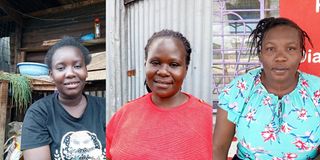How women of Kivumbini boldly stood in solidarity with #FreeBrian protesters

(From left) Pauline Ojwang' Lucy Achieng and Mercy Achieng speak of the active role that women played in the #FreeBrian protests in Kivumbini estate.
When news broke about Brian Odhiambo’s abduction, no one anticipated the wave of protests that would follow. The demonstrations, among the largest ever witnessed in Nakuru, lasted for six days.
While the protests drew a significant number of young people from the estates, the active participation of women was also notable. Many not only helped amplify the cause but also played a key role in following up on the court proceedings.
Some women were directly involved in the protests, joining the youth in running battles with the police, while others stood on the side lines in solidarity.
Lucy Achieng’, a resident of Kaloleni C, says she actively took part in the demonstrations because Brian’s case was not an isolated incident—it was part of a worrying pattern that needs to end.

Lucy Achieng poses for a photo after an interview with Mtaa Wangu.
“Brian’s case was not the first. I joined the protest to send a message that the disappearance of young men, especially those who go fishing, must stop,” she explains.
Beyond that, Lucy says she also stood in solidarity with Brian’s mother, understanding the pain of losing a child and the need to seek justice.
During the protests, she ensured there was enough water outside her house in buckets for the youth affected by tear gas, efforts that were also made by all the women in the estate.
The mother of three notes that while the demonstrations were intended to be peaceful, they turned chaotic once the police intervened.
Pauline Ojwang’ echoes Lucy’s sentiments, stating that she too was part of the protest. When clashes with the police broke out, she and other women provided water to the demonstrators and ensured refills in buckets and bottles.

Pauline Ojwang poses for a photo after an interview with Mtaa Wangu.
“From the first day, I was actively participating. But when things turned chaotic, we agreed that our best way to support the youth was by ensuring they had enough water for drinking and washing off tear gas,” she says.
Pauline adds that they also sheltered some protestors, fearing that if they were arrested, they might suffer the same fate as Brian.
She believes that the involvement of women helped bring more attention to the case and is hopeful that justice will prevail.
She further criticizes law enforcement, noting that while officers frequently harass young men, they have neglected more pressing issues, such as human-wildlife conflicts in the area.
Mercy Ochieng, a youth leader, says the strong presence of women in the protests was a clear sign of their frustration over the recurring disappearances.

Mercy Ochieng poses for a photo after an interview with Mtaa Wangu.
“The women are tired of losing their husbands, sons, and brothers just because they went fishing to earn a living,” she says.
She warns that if the issue is not addressed, it will escalate into a full-blown crisis, with women bearing the brunt—left as widows, struggling to raise children who might eventually fall into crime or drug abuse.
Determined to see justice served, the women vow to continue protesting until Brian is found.


